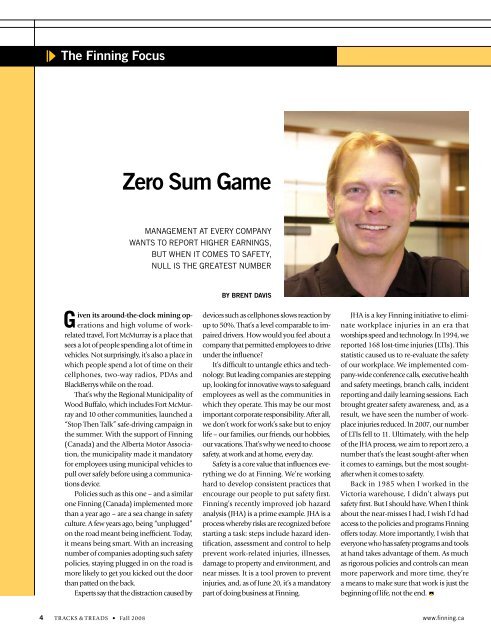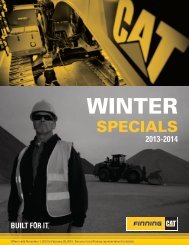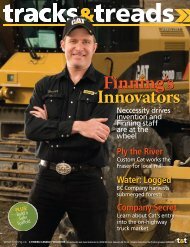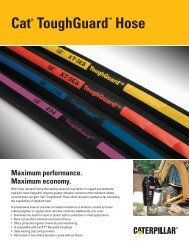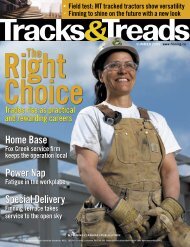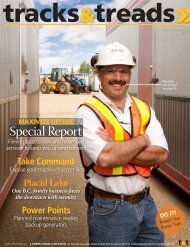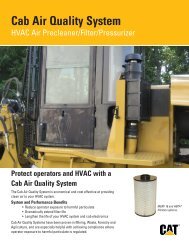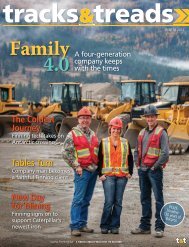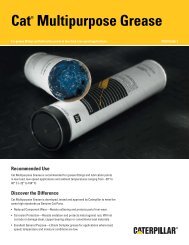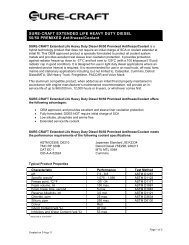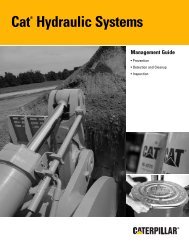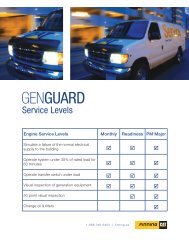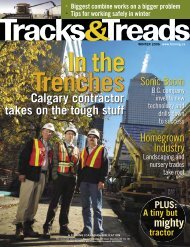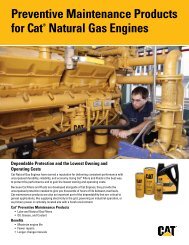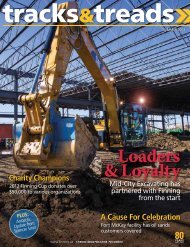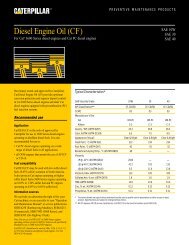Tracks and Treads - Finning Canada
Tracks and Treads - Finning Canada
Tracks and Treads - Finning Canada
Create successful ePaper yourself
Turn your PDF publications into a flip-book with our unique Google optimized e-Paper software.
The <strong>Finning</strong> Focus<br />
Zero Sum Game<br />
Management at every company<br />
WANTS TO REPORT HIGHER EARNINGS,<br />
BUT WHEN IT COMES TO SAFETY,<br />
null is the greatest number<br />
G<br />
iven its around-the-clock mining operations<br />
<strong>and</strong> high volume of workrelated<br />
travel, Fort McMurray is a place that<br />
sees a lot of people spending a lot of time in<br />
vehicles. Not surprisingly, it’s also a place in<br />
which people spend a lot of time on their<br />
cellphones, two-way radios, PDAs <strong>and</strong><br />
BlackBerrys while on the road.<br />
That’s why the Regional Municipality of<br />
Wood Buffalo, which includes Fort McMurray<br />
<strong>and</strong> 10 other communities, launched a<br />
“Stop Then Talk” safe-driving campaign in<br />
the summer. With the support of <strong>Finning</strong><br />
(<strong>Canada</strong>) <strong>and</strong> the Alberta Motor Association,<br />
the municipality made it m<strong>and</strong>atory<br />
for employees using municipal vehicles to<br />
pull over safely before using a communications<br />
device.<br />
Policies such as this one – <strong>and</strong> a similar<br />
one <strong>Finning</strong> (<strong>Canada</strong>) implemented more<br />
than a year ago – are a sea change in safety<br />
culture. A few years ago, being “unplugged”<br />
on the road meant being inefficient. Today,<br />
it means being smart. With an increasing<br />
number of companies adopting such safety<br />
policies, staying plugged in on the road is<br />
more likely to get you kicked out the door<br />
than patted on the back.<br />
Experts say that the distraction caused by<br />
By Brent Davis<br />
devices such as cellphones slows reaction by<br />
up to 50%. That’s a level comparable to impaired<br />
drivers. How would you feel about a<br />
company that permitted employees to drive<br />
under the influence<br />
It’s difficult to untangle ethics <strong>and</strong> technology.<br />
But leading companies are stepping<br />
up, looking for innovative ways to safeguard<br />
employees as well as the communities in<br />
which they operate. This may be our most<br />
important corporate responsibility. After all,<br />
we don’t work for work’s sake but to enjoy<br />
life – our families, our friends, our hobbies,<br />
our vacations. That’s why we need to choose<br />
safety, at work <strong>and</strong> at home, every day.<br />
Safety is a core value that influences everything<br />
we do at <strong>Finning</strong>. We’re working<br />
hard to develop consistent practices that<br />
encourage our people to put safety first.<br />
<strong>Finning</strong>’s recently improved job hazard<br />
analysis (JHA) is a prime example. JHA is a<br />
process whereby risks are recognized before<br />
starting a task: steps include hazard identification,<br />
assessment <strong>and</strong> control to help<br />
prevent work-related injuries, illnesses,<br />
damage to property <strong>and</strong> environment, <strong>and</strong><br />
near misses. It is a tool proven to prevent<br />
injuries, <strong>and</strong>, as of June 20, it’s a m<strong>and</strong>atory<br />
part of doing business at <strong>Finning</strong>.<br />
JHA is a key <strong>Finning</strong> initiative to eliminate<br />
workplace injuries in an era that<br />
worships speed <strong>and</strong> technology. In 1994, we<br />
reported 168 lost-time injuries (LTIs). This<br />
statistic caused us to re-evaluate the safety<br />
of our workplace. We implemented company-wide<br />
conference calls, executive health<br />
<strong>and</strong> safety meetings, branch calls, incident<br />
reporting <strong>and</strong> daily learning sessions. Each<br />
brought greater safety awareness, <strong>and</strong>, as a<br />
result, we have seen the number of workplace<br />
injuries reduced. In 2007, our number<br />
of LTIs fell to 11. Ultimately, with the help<br />
of the JHA process, we aim to report zero, a<br />
number that’s the least sought-after when<br />
it comes to earnings, but the most soughtafter<br />
when it comes to safety.<br />
Back in 1985 when I worked in the<br />
Victoria warehouse, I didn’t always put<br />
safety first. But I should have. When I think<br />
about the near-misses I had, I wish I’d had<br />
access to the policies <strong>and</strong> programs <strong>Finning</strong><br />
offers today. More importantly, I wish that<br />
everyone who has safety programs <strong>and</strong> tools<br />
at h<strong>and</strong> takes advantage of them. As much<br />
as rigorous policies <strong>and</strong> controls can mean<br />
more paperwork <strong>and</strong> more time, they’re<br />
a means to make sure that work is just the<br />
beginning of life, not the end.<br />
tracks & treads • Fall 2008 www.finning.ca


